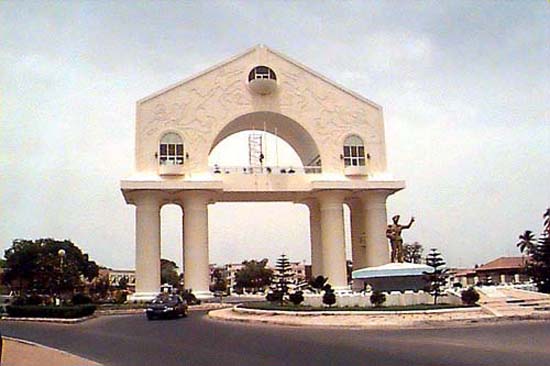
Peace Corps Country Director, Thomas K. Morgan, said since AIDS was first identified in the early 80s, his organisation had been working tirelessly to help individuals and communities understand the disease, and to collectively develop solutions for the prevention and control of the disease
As AIDS aggravates SOS Njie envisages for the closure of motels…
BANJUL, December 17 -- The SOS for Communication, Information and Technology Mr. Bakary Njie, has called for the slamming down of some public houses which, as he puts it, ‘are glaringly contributing to the spread of the AIDS virus.
They should be reported to the authorities by vigilante groups for their possible closure’, he stressed. Speaking on the devastating effects of the pandemic at an exhibition workshop, Njie tagged the killer disease as ‘the most threatening epidemic eroding the fabric of our society, because of its destructive effects on the population, particularly the productive sector of society.’
He said that a viable mechanism for the ultimate eradication of the killer disease requires the collective efforts of donor agencies, NGOs and the government, particularly the health sector.
According to him, the most fundamental strategy it [HIV/Aids] involves the sophistication of IT systems in critical sectors, such as health, education youth development, agriculture, trade and industry, as these branches of the economy encompass the most critical components of development with a greater impact on poverty reduction.
‘The fact that AIDS is a killer disease rubbishes the socio-economic development, which is essential to target our economically active population for the sensitization campaign, as it is only through information network awareness that we could minimize the impact of this disease’, he told the gathering.
Furthermore, he went on, the pandemic, which is the most widely spread and frightening disease usually has a strangle hold on the most active spectrum of the society.
Peace Corps country Director, Thomas K. Morgan, said since the first case was first identified in the early 80s, his organisation had been working tirelessly to help individuals and communities understand the disease, and to collectively develop solutions for the prevention and control of the disease.
‘We have set up a HIV/AIDS information corner at our Fajara main office, as well as in the regional offices in Kerewan, Bansang and Basse, providing regular updates on HIV/AIDS information’, he revealed, adding that teachers are trained on guidance and counseling in collaboration with the DOSE.
Peace Corps, he further added, is also engaged in other activities to combat the stigmatization and discrimination of people living with the virus. In his remarks, WHO Country Representative, Dr.
James Mwanzia lamented that the stigma and discrimination are two deeply rooted vices in society ‘which is undermining and threatening the intervention of preventive care and support for the people living with the virus.’ Mwanzia spoke of women who, he said, when affected with the virus ‘are often accused of prostitution and promiscuous tendencies, though men should not be spared from HIV/AIDS related stigma and discrimination’ he stressed.
Wrapping up, he called for efforts to be devoted to the stigma reduction within the context of HIV/AIDS prevention and control in line with the Abuja Declaration and the United Nations Declaration of Commitment endorsed by the United Nation General Assembly Special Session on HIV/AIDS in June 2001. - Independent
